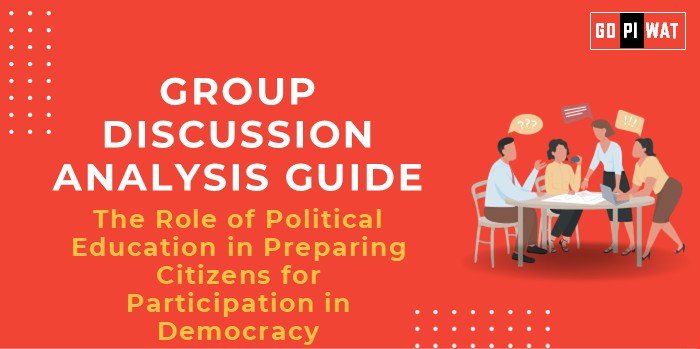📋 Group Discussion Analysis Guide: The Role of Political Education in Preparing Citizens for Participation in Democracy
🌐 Introduction to the Topic
- 🌍 Opening Context: Democracies thrive when citizens actively participate in governance, yet voter apathy and limited political awareness often hinder this process. Political education bridges this gap, cultivating informed citizens capable of meaningful participation.
- 📜 Topic Background: Political education aims to enlighten citizens about democratic principles, rights, and responsibilities. Programs like UNESCO’s Education for Global Citizenship have historically emphasized fostering civic awareness globally. However, many democracies still grapple with the lack of structured political education in curricula.
📊 Quick Facts and Key Statistics
- 📈 Voter Turnout in Global Democracies: Averaging 68% (World Bank, 2022) – underscores varying citizen engagement levels.
- 📉 Political Literacy Index: 35% of young adults (18-24 years) are unaware of basic constitutional rights (Global Youth Study, 2023).
- 📚 Civic Education Penetration: Only 22% of schools globally mandate political education as part of the curriculum (UNESCO, 2023).
- 📊 India’s Turnout Gap: Urban voter turnout trails rural by 10% in the 2019 general elections (ECI Report, 2019).
🏛️ Stakeholders and Their Roles
- 🏢 Government: Integrates civic education in school curricula, enforces voter education drives, and supports NGOs.
- 🎓 Educational Institutions: Develop and deliver comprehensive political education programs.
- 📰 Media: Acts as a channel for disseminating political awareness and fostering debates.
- 👥 Citizens: Active learners and participants, influencing governance through informed voting and activism.
🏆 Achievements and Challenges
✨ Achievements:
- 📈 Increased Voter Awareness: Campaigns like “Sweep India” increased rural voter turnout by 12% (Election Commission, 2019).
- 🌟 Global Successes: Finland’s comprehensive civic curriculum boosted youth voting rates to 80% (European Political Studies, 2021).
- 💻 Digital Education Tools: E-learning platforms have expanded access to civic education in Africa, reaching 15 million users in 2022.
⚠️ Challenges:
- 💸 Limited funding and lack of integration into mainstream education.
- 📉 Rural and gendered disparities in access to political knowledge.
- 🌀 Influence of misinformation and polarization.
🌍 Global Comparisons:
- ✅ Success: Scandinavian countries effectively implement civic education, improving political participation.
- ❌ Challenges: In the US, declining trust in institutions hampers the effectiveness of civic education programs.
📖 Case Study: Kerala, India: High literacy rates correlate with exemplary voter turnout and informed political activism.
💬 Structured Arguments for Discussion
- ✅ Supporting Stance: “Political education is the cornerstone of democracy, enabling citizens to hold governments accountable.”
- ❌ Opposing Stance: “Political education risks politicization and bias, potentially undermining its credibility.”
- ⚖️ Balanced Perspective: “While political education fosters informed participation, its success depends on unbiased and inclusive implementation.”
💡 Effective Discussion Approaches
- 🎯 Opening Approaches:
- 📊 Cite global statistics on voter turnout and political awareness.
- 💡 Discuss the role of education in addressing political apathy.
- 🛡️ Counter-Argument Handling:
- 🌟 Example: Respond to concerns about bias by advocating for balanced curricula developed by bipartisan committees.
📌 Strategic Analysis of Strengths and Weaknesses
- 🌟 Strengths: Promotes informed citizenship and empowers marginalized communities.
- ⚠️ Weaknesses: Implementation challenges and risk of political manipulation.
- 🌟 Opportunities: Leveraging digital platforms for wider reach.
- ⚠️ Threats: Rising misinformation campaigns.
📚 Connecting with B-School Applications
- 💼 Real-World Applications: Linking political education to CSR initiatives in community development.
- 🗨️ Sample Interview Questions:
- 🌍 “How can businesses support political education without being partisan?”
- 💡 “Evaluate the role of youth in shaping political discourse.”
- 📖 Insights for B-School Students:
- 📚 Explore the interplay between business and policy in ensuring informed citizenry.


